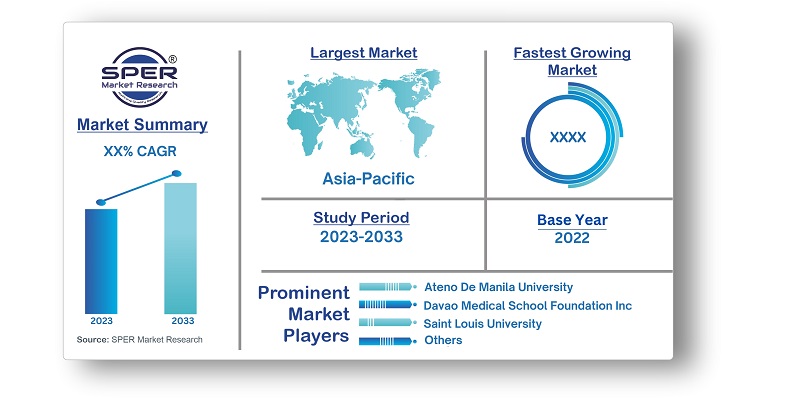
Philippines Medical Education Market Growth, Size, Trends, Scope, Challenges and Future Outlook
Philippines Medical Education Market Size- By Type of Institution, By Internal Medicine- Regional Outlook, Competitive Strategies and Segment Forecast to 2033
| Published: Jul-2023 | Report ID: EDUI2322 | Pages: 1 - 103 | Formats*: |
| Category : Education Industry | |||
- Increasing Demand for Healthcare Professionals: As the population ages, so does the demand for healthcare services and professionals such as doctors, nurses, and other healthcare specialists. As a result of this demand, more students are pursuing medical education in order to address the country's healthcare demands.
- Improving Healthcare Infrastructure: As the government works to improve healthcare facilities and infrastructure throughout the Philippines, there is an increased demand for trained medical professionals to work in these newly constructed or updated healthcare institutions. This motivates students to pursue medical degrees in order to fill these job openings.


| Report Metric | Details |
| Market size available for years | 2019-2033 |
| Base year considered | 2022 |
| Forecast period | 2023-2033 |
| Segments covered | By Type of Institution, By Internal Medicine |
| Regions covered | Metro Manila, South Luzon, Mindanao, North and Central Luzon, Visayas. |
| Companies Covered | Ateno De Manila University, Davao Medical School Foundation Inc, De La Salle Medical and Health Sciences Institute, MHAM College of Medicine, Saint Louis University, Saint Louis University, Southwestern University, University of the East. |
- College Level Students
- Parents and Guardians
- Healthcare Professionals
| By Type of Institution |
|
| By Distribution Channels |
|
- Philippines Medical Education Market Size (FY’2023-FY’2033)
- Overview of Philippines Medical Education Market
- Segmentation of Philippines Medical Education Market By Type of Institution (Private College, Public College)
- Segmentation of Philippines Medical Education Market By Internal Medicine (Chest Physicians, Heart, Rheumatology, Gastroenterology, Geriatric Medicine Oncology, Microbiology, Nephrology, Others)
- Statistical Snap of Philippines Medical Education Market
- Expansion Analysis of Philippines Medical Education Market
- Problems and Obstacles in Philippines Medical Education Market
- Competitive Landscape in the Philippines Medical Education Market
- Impact of COVID-19 and Demonetization on Philippines Medical Education Market
- Details on Current Investment in Philippines Medical Education Market
- Competitive Analysis of Philippines Medical Education Market
- Prominent Players in the Philippines Medical Education Market
- SWOT Analysis of Philippines Medical Education Market
- Philippines Medical Education Market Future Outlook and Projections (FY’2023-FY’2033)
- Recommendations from Analyst
1.1. Scope of the report1.2. Market segment analysis
2.1. Research data source2.1.1. Secondary Data2.1.2. Primary Data2.1.3. SPER’s internal database2.1.4. Premium insight from KOL’s2.2. Market size estimation2.2.1. Top-down and Bottom-up approach2.3. Data triangulation
4.1. Driver, Restraint, Opportunity and Challenges analysis4.1.1. Drivers4.1.2. Restraints4.1.3. Opportunities4.1.4. Challenges4.2. COVID-19 Impacts of the Philippines Medical Education Market
5.1. SWOT Analysis5.1.1. Strengths5.1.2. Weaknesses5.1.3. Opportunities5.1.4. Threats5.2. PESTEL Analysis5.2.1. Political Landscape5.2.2. Economic Landscape5.2.3. Social Landscape5.2.4. Technological Landscape5.2.5. Environmental Landscape5.2.6. Legal Landscape5.3. PORTER’s Five Forces5.3.1. Bargaining power of suppliers5.3.2. Bargaining power of buyers5.3.3. Threat of Substitute5.3.4. Threat of new entrant5.3.5. Competitive rivalry5.4. Heat Map Analysis
6.1. Philippines Medical Education Market Manufacturing Base Distribution, Sales Area, Product Type6.2. Mergers & Acquisitions, Partnerships, Product Launch, and Collaboration in Philippines Medical Education Market
7.1. Philippines Medical Education Market Value Share and Forecast, By Type of Institution, 2023-20337.2. Private College7.3. Public College
8.1. Philippines Medical Education Market Value Share and Forecast, By Internal Medicine, 2023-20338.2. Chest Physicians8.3. Heart8.4. Rheumatology8.5. Gastroenterology8.6. Geriatric Medicine8.7. Medical Oncology8.8. Microbiology8.9. Nephrology8.10. Others
9.1. Philippines Medical Education Market Size and Market Share
10.1. Philippines Medical Education Market Size and Market Share By Type of Institution (2019-2026)10.2. Philippines Medical Education Market Size and Market Share By Type of Institution (2027-2033)
11.1. Philippines Medical Education Market Size and Market Share By Internal Medicine (2019-2026)11.2. Philippines Medical Education Market Size and Market Share By Internal Medicine (2027-2033)
12.1. Philippines Medical Education Market Size and Market Share By Region (2019-2026)12.2. Philippines Medical Education Market Size and Market Share By Region (2027-2033)12.3. Metro Manila12.4. South Luzon12.5. Mindanao12.6. North and Central Luzon12.7. Visayas
13.1. Ateno De Manila University13.1.1. Company details13.1.2. Financial outlook13.1.3. Product summary13.1.4. Recent developments13.2. Davao Medical School Foundation Inc.13.2.1. Company details13.2.2. Financial outlook13.2.3. Product summary13.2.4. Recent developments13.3. De La Salle Medical and Health Sciences Institute13.3.1. Company details13.3.2. Financial outlook13.3.3. Product summary13.3.4. Recent developments13.4. MHAM College of Medicine13.4.1. Company details13.4.2. Financial outlook13.4.3. Product summary13.4.4. Recent developments13.5. Saint Louis University13.5.1. Company details13.5.2. Financial outlook13.5.3. Product summary13.5.4. Recent developments13.6. Southwestern University13.6.1. Company details13.6.2. Financial outlook13.6.3. Product summary13.6.4. Recent developments13.7. University of the East13.7.1. Company details13.7.2. Financial outlook13.7.3. Product summary13.7.4. Recent developments
SPER Market Research’s methodology uses great emphasis on primary research to ensure that the market intelligence insights are up to date, reliable and accurate. Primary interviews are done with players involved in each phase of a supply chain to analyze the market forecasting. The secondary research method is used to help you fully understand how the future markets and the spending patterns look likes.
The report is based on in-depth qualitative and quantitative analysis of the Product Market. The quantitative analysis involves the application of various projection and sampling techniques. The qualitative analysis involves primary interviews, surveys, and vendor briefings. The data gathered as a result of these processes are validated through experts opinion. Our research methodology entails an ideal mixture of primary and secondary initiatives.



Frequently Asked Questions About This Report
PLACE AN ORDER
Year End Discount
Sample Report
Pre-Purchase Inquiry
NEED CUSTOMIZATION?
Request CustomizationCALL OR EMAIL US
100% Secure Payment






Related Reports
Our Global Clients
Our data-driven insights have influenced the strategy of 200+ reputed companies across the globe.






















